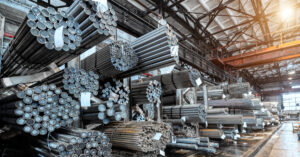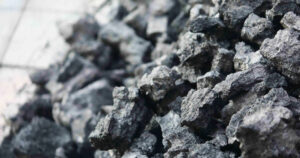
In January-August 2025, Ukrainian metallurgical enterprises increased pig iron production by 8% compared to the same period last year, to 5.109 million tons.
According to Ukrmetallurgprom, pig iron output in August amounted to 747,500 tons, compared to 621,100 tons in July.
For comparison, in 2024, Ukraine produced 7.090 million tons of pig iron (+18.1%), in 2023 – 6.003 million tons (-6.1%), in 2022 – 6.391 million tons (-69.8% compared to pre-war 2021).

Ukrainian metallurgical companies reduced their total rolled steel production by 1.4% in January-August 2025 compared to the same period last year, from 4.318 million tons to 4.256 million tons.
According to the Ukrmetallurgprom association, 633,200 tons of rolled steel were produced in August, compared to 552,000 tons in July.
As reported, Ukraine increased rolled steel production by 15.8% in 2024, to 6.222 million tons. In 2023, this figure increased by 0.4% to 5.372 million tons, and in 2022, it decreased by 72% compared to 2021.

PJSC Zaporizhkox, one of Ukraine’s largest producers of coke and chemical products and a member of the Metinvest Group, increased its blast furnace coke production by 1.46% in January-August this year compared to the same period last year, from 584,100 tons to 592,600 tons.
According to the company, 79.6 thousand tons of coke were produced in August, compared to 78.9 thousand tons in the previous month.
As reported, Zaporizhkox increased its production of blast furnace coke by 2.1% in 2024 compared to 2023, to 874,700 tons from 856,800 tons.
In 2023, Zaporizhkox increased its blast furnace coke output by 16% compared to 2022, to 856,800 tons from 737,400 tons.
Zaporizhkox has a complete technological cycle for processing coke chemical products.
Metinvest is a vertically integrated mining group of companies. Its main shareholders are SCM Group (71.24%) and Smart Holding (23.76%). Metinvest Holding LLC is the managing company of the Metinvest Group.

Danish Defense Minister Troels Lund Poulsen said that Ukrainian defense companies may soon start production in Denmark.
“The second thing I will mention today is what could be called the ‘Danish model 2.0’. I hope that in a few weeks we will invite the first Ukrainian defense company to start production here in Denmark, in a safe environment,” he said during a briefing with EU foreign policy chief Kaja Kallas on Friday.
Poulsen noted that he expects other Ukrainian defense companies to join the process later this year. “And I believe that this will also be a way to provide even more support to Ukraine,” he stressed.
The minister also said that he discussed this initiative during his visit to Kyiv on Sunday. “During this visit, I had the opportunity to talk to both President Zelensky and the new Minister of Defense Denys Shmyhal about the prospects of inviting Ukrainian defense companies to start production here in Denmark. And they fully support this idea,” he said.

PrJSC Carlsberg Ukraine, a producer of beer, non-alcoholic and alcoholic beverages, increased its production by 8% in 2024, which allowed it to increase its net income from sales by 15.5%.
According to a report in the information disclosure system of the National Securities and Stock Market Commission (NSSMC), Carlsberg Ukraine PJSC’s net financial result for 2024 increased by 19.38% and amounted to UAH 2.2 billion.
“The increase was due to revenue from the sale of all types of products, but mainly from the sale of non-alcoholic beverages (+49.6%) and cider (+33.6%),” the company explained, adding that 96.3% of the products manufactured were sold in Ukraine, with the remaining 3.7% exported.
PrJSC Carlsberg Ukraine continued its operations throughout 2024 and exported its products directly from Ukraine to more than 20 countries around the world. At the same time, the company used 100% Ukrainian barley to manufacture its products in order to support local farmers and the Ukrainian economy.
Currently, beer accounts for 86% of Carlsberg Ukraine’s production, cider for 1%, and non-alcoholic beverages for 13%.
According to the company, as a result of modernization and the launch of new lines, by the end of 2024, its market share by segment within the framework of innovations was as follows: alcoholic beer – 30%, non-alcoholic beer – 42.7%, kvass – 35%, cider – 55.8%, energy drinks – 6%.
PJSC Carlsberg Ukraine referred to data from the industry association Ukrpivo, according to which the company currently holds 33.3% of the market in the “alcoholic beer” category. The sales leaders in the group’s portfolio for 2024 were products under the Lvivske, S&R’s Garage, and Tuborg brands.
Somersby cider and Kvas Taras continue to occupy leading positions in their product categories.
According to the State Fiscal Service, Carlsberg Ukraine PJSC was included in the list of Ukraine’s largest taxpayers in 2024 and paid UAH 3.401 billion to the country’s budgets at all levels in the form of taxes and fees.
The company’s management emphasized that there is only one significant factor of uncertainty that could raise significant doubts about the company’s ability to continue its operations without interruption: a further significant escalation of military action, which could destabilize operations in Ukraine. In such a case, the Ukrainian representative office relies on the parent company having sufficient resources to continue its operations. At the same time, the Ukrainian division has promised to make every effort and take all possible measures to minimize any negative consequences.
According to data from Opendatabot, in 2024, Carlsberg Ukraine PJSC increased its revenue by 15.5% to UAH 12.488 billion, net profit by 19.4% to UAH 2.18 billion, debt obligations by 34.9% to UAH 5.11 billion, and assets by 33.1% to UAH 13.84 billion. The company currently employs 1,310 people.
Carlsberg Ukraine is part of the Carlsberg Group, one of the world’s leading brewery groups with a large portfolio of beer and other beverage brands. Carlsberg Ukraine includes factories in Zaporizhia, Kyiv, and Lviv. Carlsberg’s portfolio in Ukraine includes beer, alcoholic and non-alcoholic beverages of such brands as Lvivske, Robert Doms, Baltika, Carlsberg, Tuborg, Kronenbourg 1664, Arsenal, Kvas Taras, Somersby, etc.

The production of Ukrainian weapons will be organized in Lithuania, according to an agreement reached at a meeting between the defense ministers of the two countries, the Lithuanian Defense Ministry’s press service reported on Tuesday.
“During the meeting between Lithuanian Minister of National Defense Dovilė Šakalenė and Ukrainian Minister of Defense Denys Shmyhal, a bilateral Protocol of Intent on the production of Ukrainian weapons in Lithuania was signed, and the types of weapons to be produced and further steps were discussed,” the ministry said in a statement on its website.
It is noted that the document “provides for joint production of defense industry products, technology transfer, project development, and localization of production in Lithuania.”
“This will pave the way for long-term partnership, strengthening collective European security, and creating sustainable supply chains,” the Lithuanian Ministry of Defense said.
According to Šakalėnė, Lithuania remains firmly committed to further supporting Ukraine. According to the minister, “in the coming years, it is planned to allocate more than EUR 200 million to support Ukraine for projects related to armaments, anti-drone systems, demining, rehabilitation, training, and support for Ukraine’s defense industry.” The Lithuanian Defense Minister also announced in Kyiv that Lithuania intends to contribute up to EUR 30 million to the PURL (Prioritized Ukraine Requirements List) initiative.
The minister also met with the leadership of the Ukrainian Air Force and air defense experts to discuss emerging challenges, lessons learned, and innovations in the field of air defense.
“We discussed Ukraine’s latest decisions in response to the changing situation with air threats and technological innovations. I want to ensure the most effective cooperation possible in strengthening our air defense and responding to the changing technologies and methods used by Russia. We agreed to hold regular expert consultations on the application of practical experience to strengthen our air defense,” Shakalene said.
According to her, “it is extremely important to strengthen airspace surveillance in order to detect Russian drones heading for Belarus as early as possible, which may subsequently violate Lithuanian airspace. To this end, it was agreed to exchange information between representatives of our air forces.”